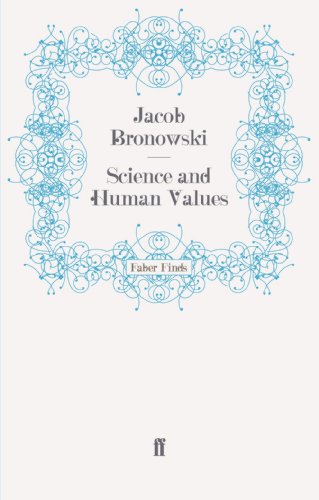The Culture of Scientists
This is the light by which the working of society is to be examined. And in order to keep the study in a manageable field I will continue to choose a society in which the principle of truth rules. Therefore the society which I will examine is that formed by scientists themselves: it is the body of scientists.
It may seem strange to call this a society, and yet it is an obvious choice; for having said so much about the workings of science, I should be shirking all our unspoken questions if I did not ask how scientists work together.^* The dizzy progress of science, theoretical and practical, has depended on the existence of a fellowship of scientists which is free, uninhibited and communicative. It is not an upstart society; for it derives its traditions, both of scholarship and of service, from roots which reach through the Renaissance into the monastic communities and the first universities. The men and women who practice the sciences make a company of scholars which has been more lasting than any modern state. yet which has changed and evolved as no Church has. What power holds them together?
In an obvious sense, theirs is the power of virtue. By the worldly standards of public life, all scholars in their work are of course oddly virtuous. They do not make wild claims, they do not cheat, they do not try to persuade at any cost. they appeal neither to prejudice nor to authority, they are often frank about their ignorance, their disputes are fairly decorous, they do not confuse what is being argued with race, politics, sex or age, they listen patiently to the young race, politics, sex or age, they listen patiently to the young and to the old who both know everything. These are the general virtues of scholarship, and they are peculiarly the virtues of science. Individually, scientists no doubt have human weaknesses. Several of them may have mistresses or read Karl Marx; some of them may even be homosexuals and read Plato. But in a world in which state and dogma seem always either to threaten or to cajole, the body of scientists is trained to avoid and organized to resist every form of persuasion but the fact. A scientist who breaks this rule, as Lysenko has done, is ignored. A scientist who finds that the rule has been broken in his laboratory, as Kammerer found, kills himself.
Notes:
Scientists form a culture, a virtuous culture, as Bronowki describes it.
Folksonomies: science culture society virtue
Taxonomies:
/society (0.574619)
/religion and spirituality (0.382466)
/science/social science/philosophy (0.339177)
Keywords:
scientists (0.976317 (positive:0.438033)), society (0.965797 (positive:0.668871)), manageable field (0.955587 (positive:0.668871)), truth rules (0.930129 (positive:0.668871)), obvious choice (0.929394 (negative:-0.314805)), unspoken questions (0.927442 (neutral:0.000000)), obvious sense (0.916325 (neutral:0.000000)), dizzy progress (0.914310 (neutral:0.000000)), upstart society (0.911709 (neutral:0.000000)), worldly standards (0.906990 (neutral:0.000000)), monastic communities (0.906154 (neutral:0.000000)), general virtues (0.902131 (neutral:0.000000)), modern state. (0.901049 (positive:0.212169)), virtuous culture (0.897694 (positive:0.331338)), public life (0.891673 (neutral:0.000000)), human weaknesses (0.889605 (neutral:0.000000)), wild claims (0.888846 (negative:-0.336020)), Karl Marx (0.876278 (negative:-0.310085)), young race (0.861684 (positive:0.350892)), science (0.761688 (negative:-0.248404)), /p (0.757419 (positive:0.294283)), scholars (0.722350 (positive:0.325646)), power (0.717589 (positive:0.524377)), scholarship (0.717499 (positive:0.272980)), body (0.712879 (neutral:0.000000)), scientist (0.706913 (negative:-0.362167)), politics (0.695163 (neutral:0.000000)), sex (0.695118 (neutral:0.000000)), Kammerer (0.679616 (neutral:0.000000)), Lysenko (0.674745 (neutral:0.000000))
Entities:
scientist:JobTitle (0.901293 (positive:0.050954)), Karl Marx:Person (0.439248 (negative:-0.310085)), Lysenko:Person (0.424481 (neutral:0.000000)), Kammerer:Person (0.413972 (negative:-0.438878)), Bronowki:Person (0.380059 (neutral:0.000000))
Concepts:
Virtue (0.946104): dbpedia | freebase | opencyc
Science (0.869495): dbpedia | freebase | opencyc
Karl Marx (0.685197): dbpedia | freebase | opencyc | yago
Plato (0.629436): dbpedia | freebase | opencyc | yago
Religion (0.611759): dbpedia | freebase | opencyc
Scientific method (0.564917): dbpedia | freebase
Patience (0.530159): dbpedia | freebase | opencyc
Political philosophy (0.515414): dbpedia | freebase | opencyc






